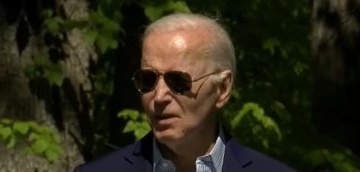Numerous Democrats who have helped the Biden administration restrict fossil fuel development and production are now concerned about high gas prices as the 2024 elections loom.
A group of 23 Senate Democrats — including Senate Majority Leader Chuck Schumer, Massachusetts Sen. Liz Warren and Pennsylvania Sen. Bob Casey — signed a Thursday letter to Attorney General Merrick Garland asking him to have the Department of Justice (DOJ) investigate major energy companies for allegedly colluding to raise gas prices for Americans and fatten their bottom lines. The suggestion that oil companies are illegally collaborating to rip off American consumers is not new to Democrats, who have revived the narrative as prices at the pump tick up ahead of the 2024 elections.
“The federal government must use every tool to prevent and prosecute collusion and price fixing that may have increased gasoline, diesel fuel, heating oil, and jet fuel costs in a way that has materially harmed virtually every American household and business,” the letter states. “We therefore urge the Department of Justice to investigate the oil industry, to hold accountable any liable actors, and to end any illegal activities.”
Big Oil – DOJ Letter by Nick Pope on Scribd
The letter references ExxonMobil’s recent acquisition of Pioneer Natural Resources and amplifies the Federal Trade Commission’s (FTC) allegation that Chris Sheffield, the founder and ex-CEO of Pioneer, tried to organize collusion between American and OPEC energy producers to artificially inflate profits. Sheffield, however, has strongly contested this allegation, saying that the “FTC is wrong to imply that [he] ever engaged in, promoted or even suggested any form of anti-competitive behavior” in a statement.
Beyond Warren, Schumer and Casey, other signatories include Democratic Sens. Chris Murphy of Connecticut, Sheldon Whitehouse of Rhode Island, Ed Markey of Massachusetts, Sherrod Brown of Ohio and Independent Vermont Sen. Bernie Sanders. Each Senator who signed the letter also voted for the Inflation Reduction Act (IRA), Biden’s flagship climate bill, and have also supported many other facets of the Biden administration’s efforts to move the U.S. away from fossil fuels.
Warren’s voting record has earned her a 95% lifetime approval score from the League of Conservation Voters (LCV), one of the country’s largest influential environmental groups that openly rejects fossil fuels, and a 100% score for 2023. Last year, Warren voted against an attempt to rein in the government’s push to regulate a wide array of consumer appliances, a bill promoting the Mountain Valley Pipeline and to protect a Labor Department rule pushing asset managers to incorporate climate risks in their investment decisions.
Casey voted in favor of the Mountain Valley Pipeline, but joined Warren on the other two votes. He also voted against a 2022 effort to increase the number of government-issued oil lease sales and opposed another 2022 move that would have prevented federal permitting or regulatory actions from hindering fossil fuel development.
Schumer also voted to support the Mountain Valley Pipeline in 2023, but he has voted in line with what LCV advised in every other instance since Biden took office in 2021, with one exception. He has opposed four legislatives proposals that would have made it easier or less expensive to produce oil and gas throughout Biden’s first term.
Murphy voted against the Mountain Valley Pipeline, and also opposed legislation that would have increased offshore and onshore oil and gas development.
Whitehouse voted against the Mountain Valley Pipeline, as well as numerous legislative efforts to enhance oil and gas leasing activity. Markey, meanwhile, has consistently voted against legislation intended to make it easier to produce oil and gas for his entire career.
Brown voted to support the Mountain Valley Pipeline, but he has opposed four initiatives meant to boost oil drilling through Biden’s first term. Sanders, one of the most left-wing lawmakers in Washington, also voted against the four same legislative efforts and has consistently opposed bills designed to make drilling easier throughout his career.
Gas prices are increasing as the pivotal 2024 elections approach on the calendar. In January, the national average per-gallon price of all formulations of gasoline was approximately $3.08, a figure that has increased to $3.60 as of May, according to data from the U.S. Energy Information Administration (EIA).
The administration is moving to release about one million barrels of gasoline from the Northeast Gasoline Supply Reserve to try to bring down prices this summer. The administration also released 180 million barrels of oil from the Strategic Petroleum Reserve (SPR) ahead of the 2022 midterms, selling several million barrels to Chinese companies and leaving the SPR at its lowest levels in decades.
Numerous economists and analysts, and even the CEO of Chevron, have credited the price increases in part to the Biden administration’s $1 trillion-plus climate agenda.
The administration has made many decisions that restrict domestic oil and gas production, pushed aggressive environmental regulations impacting energy producers and established massive subsidy programs to favor sources of green energy like wind and solar. These choices have the combined effect of driving up prices that consumers pay at the pump and elsewhere over time, according to the American Energy Alliance, a right-leaning energy advocacy group.
In January 2020, just before the onset of the pandemic, Americans paid an average of $2.55 per gallon for all types of gas, according to the EIA. Those figures have grown considerably since November 2020, the month that President Joe Biden won the presidential election; the average price sat at $3.61 per gallon in April 2024 after peaking at $4.92 in June 2022.
Democrats pushed similar messaging about major energy companies and collusion in 2022, when gas prices were causing political headaches for Biden and fellow Democrats ahead of the 2022 midterm elections. However, analysts from the Dallas branch of the Federal Reserve argued at the time that corporate collusion was not one of the factors driving up retail gasoline costs, pointing out that energy producers actually have almost zero control over the prices set by gas station operators.
The offices of Schumer, Warren, Casey, Brown, Murphy, Durbin, Whitehouse and Sanders did not respond to requests for comment.
All content created by the Daily Caller News Foundation, an independent and nonpartisan newswire service, is available without charge to any legitimate news publisher that can provide a large audience. All republished articles must include our logo, our reporter’s byline and their DCNF affiliation. For any questions about our guidelines or partnering with us, please contact [email protected].



























 Continue with Google
Continue with Google